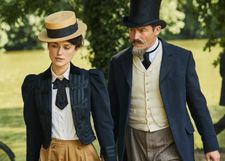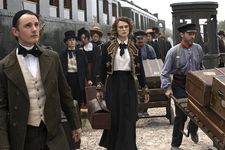Wash Westmoreland's incisive Colette, co-written with Richard Glatzer and Rebecca Lenkiewicz (co-writer of Sebastián Lelio's Disobedience and Pawel Pawlikowski's Oscar-winner Ida) knows that its heroine, portrayed by Keira Knightley, will always be larger than what is on screen. Her husband Willy (Dominic West) forced her to write, she obeyed, masterful literature was born. The narrative is more entangled than that. Colette's parents in the countryside, Robert Pugh as her father Jules and Fiona Shaw as her mother Sido, are personalities in their own right, not just caricatures that help the plot along.
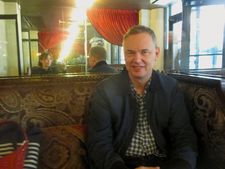 |
| Wash Westmoreland on La Belle Époque: "There's an embrace of the modern, the new, unusual gestures, different tempo breaks in music, new kind of melodic structures." Photo: Anne-Katrin Titze |
A Paris-Soir Moulin Rouge interview of Colette and her lover Missy (Denise Gough), Dickie Beau's Wague, Catherine Breillat's sister Marie-Hélène Breillat as Colette's Claudine (directed by Édouard Molinaro), Soko as Loie Fuller in Stéphanie Di Giusto's The Dancer, La Belle Époque, and Keira's mother's obsession with Colette, all come up in the second episode of my conversation with Wash Westmoreland (who has a great cameo in Todd Haynes's Velvet Goldmine).
In Colette, we can read Missy's thoughts in just a tilt of his head or the way he feels utterly comfortable in his suit and tie. Wague, the "king of pantomime in Paris", who wove in and out of Colette's life, and had great importance for her career change, resurrects a forgotten form of entertainment in front of our eyes.
There is a sense of joyous celebration throughout - which is no small feat considering the fact that a lot of what we see deals with oppression, betrayal, and an attempt at ownership. Ultimately, Colette is Keira Knightley's film and there seems to be a double-layer in her performance.
Anne-Katrin Titze: My first encounter with Colette was on a French television program with Catherine Breillat's sister [Marie-Hélène Breillat]. Do you know what I'm talking about?
Wash Westmoreland: I'm not familiar with that.
AKT: I was maybe five years old and I remember being absolutely fascinated. It must have been a Claudine story. Keira's performance captures some of that original fascination for me.
WW: Keira's mother was obsessed with Colette. The books were around the house when Keira was growing up. Keira's mother was a writer. A writer who, very much like Colette, took the stuff of her life and made it into plays or maybe into literature. I think there was a very close connection between Keira's upbringing and this feeling of Colette's values.
AKT: Did Keira have a core scene for herself, as far as you could sense?
WW: There's two. The big last scene where she finally finds her voice and takes on Willy [Dominic West]. I knew Keira could do this because I had seen in [Joe Wright's] Pride & Prejudice how strongly she takes apart Mr. Darcy [Matthew Macfadyen]. I wanted to even take it further to get into the psycho-sexual hold that Willy had over Colette.
And Keira just did the most amazing job, I couldn't cut away. The camera is on her for like a minute and a half. She just absolutely delivers it. That was the last day of the shoot. And she was a little nervous about it but she completely aced it.
One of my personal favourites is after the Moulin Rouge where she's interviewed by a reporter backstage and she just comes out firing on all cylinders and just gives that monologue about like "Do you think I'm intimidated? Look at me, is my hand shaking?"
AKT: Yes, that scene is great.
WW: Those are the actual words that Colette said according as reported by the Paris-Soir. Including what Missy [Denise Gough] said as well. We just took that verbatim into the script. The way Keira delivered it and the stomp, and that "Nothing is going to stop me" attitude, I felt, was so Colette. It just crystallised in that moment.
AKT: And still to this day it is necessary to see scenes like it. That we see people who show what they believe in.
WW: What she was doing was so radical. A lot of times in movies about marriages when the marriage starts to get into strain there's lots of meaningful looks into the mid-distance. With Colette she decided to go on the stage.
AKT: And change her life completely.
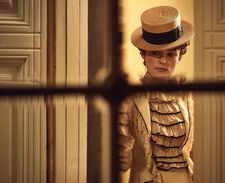 |
| Wash Westmoreland on Keira Knightley: "I think there was a very close connection between Keira's upbringing and this feeling of Colette's values." |
WW: Yes, because I see such a direct connection between Willy refusing to give her credit on the Claudines and her need to be up on the stage, doing something that no one can take away from her. That is her words, her voice, her artistic expression.
The plays she put on the stage were really more like performance art. They weren't performed in high theatre or kind of Shakespearean environment, but very much in the music hall with the performing dogs and the Russian acrobats and that whole crowd that fed into the vagabond novel. That's where she found her true community. Unlike the bourgeois salons where she always felt a little bit of a misfit.
AKT: It also coincides with the beginning of cinema.
WW: It does. The style of mime was very much influential on the early silent films. And this character Wague, who was the king of pantomime in Paris. Pantomime was a radical form at the time. He broke the traditional alphabet of representation for mimes. There was always a standard set of gestures. He went to something called "white pantomime" that was much more free-flowing. Anything could be communicated with the language of the body.
Dickie Beau who plays that part, who is a mime in real life, just did such an amazing job of channelling Wague's energy. An Colette, it really appealed to her and they performed The Dream Of Egypt, they performed Flesh. You know, Colette was on stage baring her breast at a time when a lot of women weren't showing their ankles. She was really fearless in her expression.
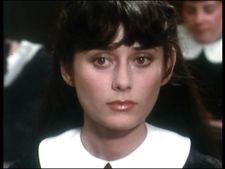 |
| Marie-Hélène Breillat as Colette's Claudine in the four-part French television adaptation. |
She was notorious. Always for the rest of her life it was seen as a little scandalous that she danced naked on the stage. It was seen as a little bit naughty, the Colette postcards.
AKT: Did you see the Loie Fuller film The Dancer? A French film with Soko, it came out last year? It's fascinating to look at all these female performers at the end of the Belle Époque who push forward into new directions. And the beginning of cinema, which didn't come from the bourgeoisie and had a touch of naughtiness attached to it.
WW: It came from the music hall, right. Yeah, that is so interesting. There were many radical things happening in dance. The Rite of Spring is just a few years in the future.
There's an embrace of the modern, the new, unusual gestures, different tempo breaks in music, new kind of melodic structures. All that stuff was really electric and challenging. It was a fantastic time artistically until the First World War came and brought an end to that era.
Read what Wash Westmoreland had to say on Richard Glatzer, costume designer Andrea Flesch, nature, and the relationships in Colette.








![Wash Westmoreland on the dynamic between Keira Knightley and Dominic West: "I had seen in [Joe Wright's] Pride & Prejudice how strongly she takes apart Mr. Darcy [Matthew Macfadyen]. I wanted to even take it further to get into the psycho-sexual hold that Willy had over Colette."](/images/newsite/Keira_Knightley_1_600.jpg)
